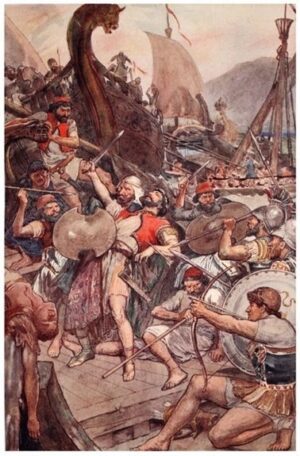The ancient Greeks and Romans are renowned for their contributions to human civilization, yet their interactions with foreign powers shaped their destinies in unique ways. This article explores the intriguing historical contrast between Greek resistance to Persian invasion and their eventual acceptance of Roman rule.
To comprehensively understand this complex dynamic, we will delve into various aspects, including historical context, cultural differences, military strategies, governance, and the long-term consequences of these interactions.
I. Historical Context:
1. The Persian Empire’s Expansion:
The rise of the Persian Empire under Cyrus the Great marked the beginning of a significant geopolitical shift in the ancient Near East. By the 6th century BCE, the Persians had expanded their territory, leading to conflicts with the Greeks.
Persian expansion into Anatolia (modern-day Turkey) brought the Ionian Greeks under Persian rule, setting the stage for tensions and conflicts to come.
2. The Hellenic World:
In contrast to the centralized power of the Persian Empire, the Greek world consisted of numerous city-states, each with its own unique culture and governance.
Political fragmentation was prevalent, with notable rivalries, such as the Peloponnesian War, often overshadowing any unified Greek response to external threats.
II. Greek Resistance to the Persians:
3. The Ionian Revolt:
The Ionian Greeks, living along the western coast of Anatolia, revolted against Persian rule in the early 5th century BCE. They sought independence and received support from mainland Greece, illustrating the sense of solidarity among the Greeks.
4. The Persian Wars:
The Persian Wars are pivotal in understanding Greek resistance to foreign rule. The First Persian invasion, led by Darius I, prompted the Battle of Marathon, where Greek forces emerged victorious. The Greeks demonstrated their military prowess and unity.
In the Second Persian invasion, under Xerxes, iconic battles like Thermopylae, Salamis, and Plataea took place, with Greek city-states forming a coalition to repel the Persians. This period highlighted the importance of Greek unity and alliances among city-states.
III. Cultural Differences:
5. Greek Identity:
The Greeks held a deep sense of cultural pride and identity, rooted in their unique contributions to philosophy, literature, and art.
The concept of Hellenism, which encompassed shared language, values, and traditions, played a significant role in their resistance to foreign rule.
6. Persian Culture:
Persian culture, marked by its Zoroastrian religion and administrative efficiency, differed significantly from Greek traditions. These cultural disparities influenced Greek perceptions of Persian rule and contributed to their resistance.
IV. Military Strategies:
7. Greek Military Strength:
The Greeks employed hoplite warfare, a highly effective phalanx formation, emphasizing the use of heavily armed infantry. This formation proved successful in battles against the Persians. Greek leadership and strategic acumen also played a crucial role in their victories.
8. Persian Military Tactics:
The Persian military, while vast and diverse, employed different tactics than the Greeks. Persian archers and cavalry were formidable, and their massive numbers posed challenges for Greek hoplites. Adaptation and strategic flexibility were essential for Greek success.
V. Governance and Rule:
9. Persian Governance:
The Persian Empire was characterized by a system of satraps, regional governors who exercised significant autonomy. This allowed for local rule and often played a role in Greek resistance against centralized Persian authority.
10. Roman Rule:
The transition from Persian to Roman rule marked a significant shift for the Greeks. The Roman conquest of Greece brought the Greek city-states under Roman dominion. Unlike the Persians, who allowed local autonomy, the Romans imposed more direct control over the region.
VI. Acceptance of Roman Rule:
11. Transition to Roman Rule:
The Greek response to Roman conquerors was marked by a complex interplay of factors. Greek attitudes varied, but several elements contributed to the eventual acceptance of Roman rule, including Roman military might, administrative efficiency, and economic opportunities within the Roman Empire.
12. Roman Philhellenism:
The Romans had a profound appreciation for Greek culture and intellect. This “philhellenism” led to the integration of Greek and Roman traditions, fostering an environment where Greek culture continued to thrive even under Roman rule.
VII. Long-Term Consequences:
13. Hellenistic Influence:
The Greek resistance to Persians and their subsequent integration into the Roman Empire had profound and lasting consequences. Hellenistic culture continued to spread throughout the Mediterranean world, impacting Roman art, philosophy, and education.
Greek contributions enriched the Roman Empire, leaving an indelible mark on Western civilization.
14. Decline of the Polis:
While Greek culture flourished under Roman rule, the autonomy of the Greek city-states declined. The political landscape shifted, and the emphasis on the individual city-state waned, giving way to a more centralized Roman administration.
Conclusion:
The resistance of the Greeks against the Persians and their acceptance of Roman rule are two pivotal chapters in the ancient world’s history.
While the Greeks fiercely defended their independence against the Persian Empire due to cultural pride and a shared sense of identity, their eventual integration into the Roman Empire marked the beginning of a new era in which Greek culture continued to flourish and influence the broader Mediterranean world.
These contrasting responses reveal the nuanced relationship between conquerors and conquered, highlighting the intricate interplay of culture, politics, and power that shaped the ancient world

Leave a Reply